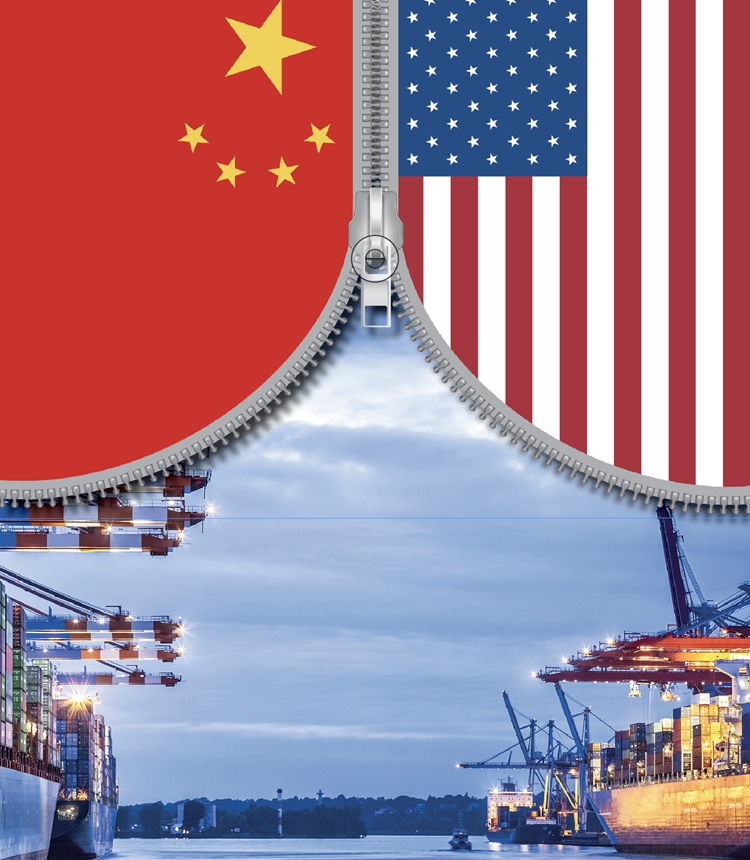HOME >> OPINION
Why not to be pessimistic about China-US ties
By Rong Xiaoqing Source:Global Times Published: 2019/12/26 21:42:38

China US Photo: VCG
I have been trying hard to stay optimistic lately. Trying hard because this year has been so depressing. In the US, people holding different political views, family and friends included, are either hurling insults or have stopped talking to one another. The outside world is also plagued by conflict, with the fight between China and the US part of it.
The chaos makes me feel I am watching the fall of the Tower of Babel. At a recent training for journalists on fighting against misinformation, I asked the trainer who would teach us wonderful skills to debunk fake information, how you can persuade people who have stopped listening that what they see online is not true. She nodded. Everyone else nodded. There was no answer.
And then, a few days before the New Year, the dark clouds that have been hovering above my heart for a while were lifted by a man named Lawrence Wolfe, at least for now.
Wolfe is the assistant principal bassist of the Boston Symphony Orchestra (BSO), where he has been working for half a century. In March 1979, 31-year-old Wolfe went on a tour to China with the BSO, the first American orchestra to do so after China and the US resumed their diplomatic relations two months earlier. In 2014, he visited again as part of the BSO's second China tour. And now, for the third time, he will be there with the orchestra in mid-February, offering concerts in the Shanghai Oriental Art Center.
Times have changed dramatically.
Glimpses offered by yellowish media clips about the 1979 tour are like a chime echoing from a previous life. Hundreds of Chinese people were "ranged in orderly rows and were applauding" when the airplane landed in China, and the distinct lexicon of that time with references to "comrades" and "musical workers" flowed freely in the welcome speeches documented by Richard Dyer of The Boston Globe.
The desperate thirst for music among the Chinese musicians performing with the orchestra and the Chinese plans to invest in instruments and build concert facilities, as outlined in an article written by the BSO's then conductor Seiji Ozawa, portrayed a China very different from the US but eager to embrace the world.
That's why, after seeing the ubiquitous gray and blue Mao suits and bicycles, tasting the provocative baijiu, learning the word "ganbei" (the Chinese word somewhere between cheers and bottom's up), and indulging in the curious but friendly gawks on the street, as well as the disciplined but persistent applauses from the audience, Wolfe concluded: "It felt normal to me. I thought I was in place." He told me: "From there, I only saw progress, a continuation of our relationship, a deeper relationship and a longer relationship."
Things certainly went this way for a long time. That was clear in the 2014 return of the orchestra. Jeans and fashionable dresses replaced the Mao suits. Pudong in Shanghai, which in Wolfe's memory was a swamp, was taken over by skyscrapers. The audience's applause was not careful and disciplined anymore. They were exploding. "When we came back, I thought the world had opened to China and China was part of the world," Wolfe said.
The bearded new father who went to China in 1979 has grown into a gray-haired septuagenarian, ready for his third China tour. The relations between Beijing and Washington have on some levels made a lot of progress.
Wolfe, who taught in the New England Conservatory, had one Chinese student in 1979, and since then, he has had more than a dozen. The BSO has four musicians from China now - it had none back then. But on many other levels, the Beijing-Washington relationship has become tense and tortuous.
"I hope we will not retreat, taking away all the progress," Wolfe said.
"But aren't we already retreating?" I lamented.
"I think this is temporary," he countered.
In the 2018 book, Factfulness: Ten Reasons We're Wrong About the World-and Why Things Are Better Than You Think, the late international health expert and public educator Hans Rosling listed 10 common human instincts that often fool us with negative and wrong perceptions of the world. One of them is the "size instinct," meaning we tend to exaggerate the implication of individual numbers, incidents and anecdotes without considering how much they contribute to the more important big picture.
Maybe this is why Wolfe is so much more optimistic than me. A quarter century older, his long timeframe makes the current period of turmoil seem less disturbing. And I am glad to acknowledge that based on Rosling's theory, Wolfe's perspective is closer to the true picture.
It's not like Wolfe has no concerns over the current squaring off everywhere among people. He is sometimes stunned by views that he regards as absurd. But he told me whenever that happens, he often goes to read a book about the topic. "I educate myself, make sure I have informed opinions," he said.
And, of course, there is music, the universal language that transcends the fall of Babel and helped Wolfe communicate with his friends in China 40 years ago. "Music will be a big part for healing and reconnection," he said.
So what a better way to spend the last few days of this difficult year than reading with music in the background? They make the world a peaceful place full of truth and beauty, at least for now.
The author is a New York-based journalist and an Alicia Patterson fellow. rong_xiaoqing@hotmail.com
RELATED ARTICLES:
Posted in: COLUMNISTS,VIEWPOINT